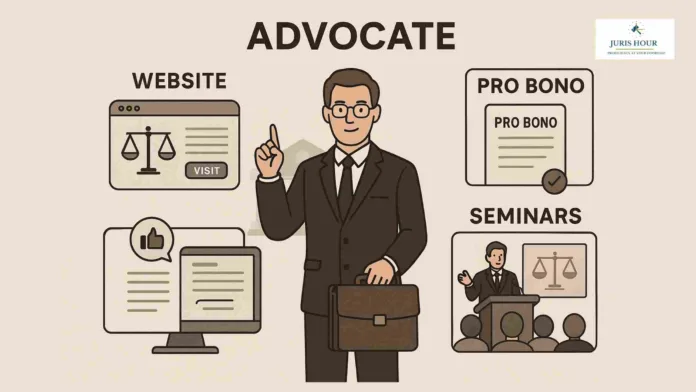Advocates in India are strictly regulated by the Bar Council of India (BCI), which prohibits direct advertising and solicitation of clients but there are some legal tricks by which Advocate can publicize his services.
Rule 36 of the Bar Council of India Rules explicitly bars lawyers from soliciting work through advertisements or circulars, either in print, television, or digital media.
However, this does not mean that advocates cannot publicize their expertise or attract new clients at all. There are ethical and legal ways to build a professional image and clientele without violating these rules. This article explores those permissible avenues.
Professional Website (Compliant with BCI Guidelines)
While blanket advertising is restricted, the BCI in 2008 allowed advocates to maintain a basic website that shares:
- Name
- Contact details
- Qualifications
- Enrollment details
- Areas of practice
- Bar Association membership
Dos:
- Keep the site informative, not promotional.
- No flashy slogans or testimonials.
- Avoid self-congratulatory content.
Don’ts:
- No mention of success rates or case outcomes.
- No paid search engine promotion or social media ads.
BCI Circular No. 36/2008 permits such websites with basic info.
Contributing Legal Articles, Blogs, and Commentaries
Writing for newspapers, magazines, or reputed online portals like LiveLaw, Bar & Bench, or Mondaq can position an advocate as an expert in a particular legal domain. Similarly, running a personal blog or LinkedIn newsletter is allowed as long as there is no solicitation.
Benefits:
- Establishes thought leadership.
- Increases visibility among potential clients and industry players.
- Enhances credibility through informed commentary.
Participating in Public Seminars, Legal Awareness Camps, and Webinars
Advocates are encouraged to spread legal literacy. Conducting or participating in awareness sessions on legal rights (e.g., women’s rights, cyber law, property disputes, taxation) enhances public visibility without violating norms.
Examples:
- Holding sessions in schools, colleges, or NGOs.
- Hosting webinars in collaboration with legal tech platforms.
- Community radio or podcast appearances (informative, not promotional).
Such educational initiatives are seen as public service, not promotion.
Joining Professional Legal Directories and Platforms
Portals like:
- Bar & Bench Directory
- IndiaLaw
- Vakilsearch (only listings, not advertisements)
- Google Business (limited use – only name, location, hours)
…allow clients to find lawyers organically.
Caveat: Ensure listings are factual. No client reviews, star ratings, or promotional content should be encouraged or displayed.
Leveraging LinkedIn Professionally
Unlike Facebook or Instagram, LinkedIn is considered a professional networking platform, and it’s acceptable to:
- Share legal updates or case law summaries.
- Discuss statutory changes or recent judgments.
- Express legal opinions (without claiming superiority).
Avoid:
- Asking for clients directly.
- Mentioning personal achievements or “victories” in court.
Building Strong Referral Networks
Word-of-mouth referrals remain the most ethical and effective way to grow clientele:
- Maintain professional relationships with fellow advocates.
- Engage with clients transparently and respectfully.
- Offer genuine advice to acquaintances and they may refer others.
This organic method is 100% compliant and builds long-term trust.
Engagement in Pro Bono Work
Pro bono work—especially in high-visibility PILs or social issues—often attracts attention from media and potential clients. While the purpose is social service, it inadvertently builds the advocate’s public reputation.
Bonus: Several reputed firms and NGOs scout lawyers for collaboration based on such initiatives.
Networking Through Legal Conferences and Bar Events
Participation in:
- Legal conclaves
- National Moot Court Judging Panels
- Bar Council activities
- Continuing Legal Education (CLE) workshops
…brings lawyers in touch with potential collaborators and clients without direct solicitation.
Publishing Books, eBooks, and Legal Handbooks
Authoring books on legal subjects builds authority and can attract a niche client base. For example:
- “Understanding Cyber Law for Startups”
- “Property Law for NRIs”
- “Divorce & Custody: A Legal Handbook”
Distribution through legal publishers or online (Amazon, Notion Press) is allowed if not promotional.
Academic Engagements and Teaching Assignments
Serving as a visiting faculty, guest lecturer, or trainer at law schools or corporate training programs:
- Enhances visibility in academic and business circles.
- Builds reputation among students, startups, HR professionals, etc.
Conclusion
While the Bar Council of India rightly discourages overt advertising to maintain the dignity of the legal profession, it still allows advocates to ethically highlight their expertise and build a professional network. The key lies in being informative, not promotional; helpful, not boastful. By leveraging education, thought leadership, and integrity, lawyers can grow a credible practice that stands the test of both law and ethics.
| Legal Method | Description | Compliance Tip |
| Basic Website | Bio, qualifications, contact info | No ads/testimonials |
| Legal Writing | Blogs, articles, opinions | Informative, no self-promotion |
| Webinars/Seminars | Legal literacy efforts | Must be non-solicitative |
| Professional Directories | Listings on legal portals | Avoid ratings/promos |
| LinkedIn Posts | Share insights or updates | No success bragging |
| Referrals | Organic network growth | Based on trust |
| Pro Bono Work | Social causes/public interest | Helps reputation organically |
| Legal Conferences | Bar association events | Professional networking |
| Publishing | Books or guides on legal issues | Must not contain self-praise |
| Teaching | Academic engagements | Builds niche visibility |

